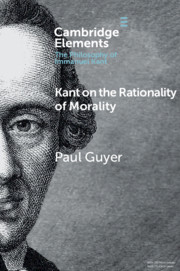Element contents
Kant on the Rationality of Morality
Published online by Cambridge University Press: 01 July 2019
Summary
- Type
- Element
- Information
- Online ISBN: 9781108529761Publisher: Cambridge University PressPrint publication: 11 July 2019
Bibliography
Primary Sources
Secondary Sources
- 7
- Cited by



